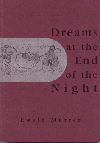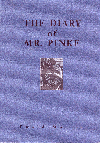 |
Vol 1, No 17
18 October 1999 |
|
|
|
B O O K R E V I E W:
Two from Ewald Murrer James Partridge Murrer, at the age of 35, is a relatively young writer, but one whose work has been published since 1990 and circulated in samizdat editions from his debut in 1980. Four of his early poems appeared in English (translated by Ian and Jarmila Milner) in the 1990 poetry anthology Child of Europe: An Anthology of East European Poetry. A short prose piece from Murrer's 1992 collection, Vyznamenani za prohranou valku (Decoration for a Lost War), was included in Alexander Buchler's fine anthology This Side of Reality (1996). The first of the two books under review here,
Murrer is probably better known as a poet than as a prose writer (five of his better poems, translated by James Naughton, are included along with this review). Many of his poems are written in the short-lined, delicate, almost minimalist style that is popular amongst contemporary poets in many countries and that often gives the impression of having been composed effortlessly. Murrer walks the tightrope between a rather charming, if unmemorable, poetry and something that comes uncomfortably close to cliche. Occasionally, there is a vague religious undertone in the poetry but even this tends to dissipate amongst the rather colourless words and unclear thought that characterises too much of his verse. More often than not I am reminded of the poems that many of us wrote and took terribly seriously when we were teenagers, but which we later hid in the loft in embarrassment. The first of the two books under review here, The Diary of Mr. Pinke, is described in Twisted Spoon Press's publicity as follows: Written as a compilation of journal entries spanning March to December, The Diary of Mr. Pinke relates the strange happenings amongst a group of town residents in a mythical region which could be the Galician countryside. Mr. Pinke pursues the symbol of purity in this Chagall-like atmosphere as people and beasts float across the landscape, leaving only cryptic traces of their passage. I assume that Murrer himself is Jewish and that the book is intended to evoke or pay homage to his Jewish roots. Unfortunately, the book creates a very different impression. One colleague I asked to read The Diary was outraged by what she felt was a cynical exploitation of the tired cliches of Eastern European Jewishness, written with an eye to future translation and aimed at gullible foreigners who hadn't heard of Isaac Bashevis Singer or Jiri Langer. This judgement is perhaps a little harsh, but the book does seem to be constructed almost entirely of just such tired cliches of small-town Jewish life in Eastern Europe (or rather its literary reconstruction), all of which should be familiar to anyone who has read a page or two of Singer. Murrer does seem to be aware that he is returning to a theme that has already been worked to death, so he tries to reanimate the corpse by writing in the minimalist style familiar to readers of his poetry. Here are two fairly representative extracts: JULY 9 The queen died slowly, she was cruel and surly. Tonight I cannot sleep; nor will I even sleep tomorrow, toward morning. I went further away from home. I greeted the marsh. Here in the blackness, a secret flower blossoms at midnight. A beautiful, enormous white flower. It attracts quiet bats. The dank mud reeked of spices. OCTOBER 23 Are you not the moon, you have such a white face. I saw you behind the hill and you fled. I read through bulky old books with the rabbi. The rabbi blew the dust off their spines. Unicorns reveal themselves in dreams. In the rabbi's books, we discovered the ancient homeland of these animals. Organ music from the heavens. …and on and on in the same vein for a hundred pages or so. If you find this compelling reading, so be it. There is nothing magical about this (even mention of Chagall in this context seems like a travesty): the language is ordinary, the stories are dull and the self-referential moments when Mr Pinke mentions a certain Mr Murrer from Prague who inexplicably enjoys these "stories" are just risible. One rarely encounters a book that has no redeeming qualities whatsoever, but in my opinion The Diary of Mr. Pinke is just such a book. Dreams at the End of the Night is Murrer's most sustained attempt at a long prose work. It consists of 17 short narratives ranging from two to six pages in length. A motley group of characters makes its way through the narratives; some of the characters - Count Lusperto and Carmen von Bulow, for instance - appear repeatedly, while others appear only once. The stories are played out against what is presumably supposed to be a phantasmagorical, perhaps even surreal, evocation of the streets and houses of Prague. Murrer isn't exactly exploring new territory here. He wrote shorter but otherwise rather similar (if more successful) prose pieces in Vyznamenani za prohranou valku. It was one of these pieces, "Do zeme propadli" (translated as "Swallowed by Earth") that Alexandra Buchler published in the anthology mentioned at the beginning of this review. The character of Count Lusperto also appears in Vyznamenani in a short cycle of poems called "The Story of Barbara and the Count" ("Pribeh o Barbare a hrabeti"). In fact, Murrer gives us some clues regarding his literary antecedents in the epigraphs at the beginning of each story. Here we find the names of Gerard de Nerval, Gustav Meyrink, Frantisek Halas and Paul Celan, amongst others; sure enough, the footprints of Symbolism in general and French/Czech Surrealism in particular are firmly imprinted all over Murrer's texts. Murrer also draws heavily on the myth of "Magic Prague," made famous in Angelo Maria Ripellino's tedious book of the same name (and, incidentally, effectively debunked by Peter Demetz in Prague in Black and Gold). Again, as with The Diary of Mr. Pinke, one is forced to ask oneself whether Murrer wasn't being a little cynical here; plenty of Prague's non-Czech residents are all too willing to buy into the myth of Prague as a place of magic and mystery. Readers of Dreams at the End of Night will have to judge for themselves. (If you wish to read really fine literature of this type, I strongly suggest that you hunt down the brilliant works of the Polish writer Bruno Schulz [1892 to 1942]). Unfortunately for Murrer, his facility with the Czech language is really not up to the job of writing such "fantastic" prose. Czechs to whom I have shown the book have commented on the ordinariness of the language: the limited vocabulary, lack of stylistic invention, and clumsy attempts at injecting some colour into the prose by fiddling with the word order. In this respect, he is lucky to have been translated by Howard Sidenberg who writes a rather more inventive English than Murrer does Czech. (I would refer interested readers to the long list of dishes at the feast described in "Up to the Garret (a celebration of boredom)" - p 38 in the English edition, p 32 in the Czech). I suppose that some people might argue that it is precisely the banality of the language, used in conjunction with symbolic and surreal imagery, that elevates Murrer's prose to some higher realm. Twisted Spoon's publicity for the book, for instance, claims: The stories are sharply ironic, erudite in their symbolism, and portray the eternal beauty of the banal in pointing to something other than its vulgarity. Personally, I don't believe a word of it: the writing is banal, nothing more. It has proven a lot more difficult to write this review than I had anticipated when I first received these two slender volumes of short prose pieces. Since finishing reading both books (no more than a couple of hours work) I have circulated them around a small circle of colleagues - some Czech, some English, most of them specialists in Czech literature - trying to gather as wide a range of opinions as possible. Unusually, in fact uniquely in my experience, we are of one mind. The fact that Murrer is considered by some in the Czech literary world to be a writer of standing just reflects badly on the current standard of literature in the Czech Republic. James Partridge, 16 October 1999 Useful Links Temptation (short prose excerpt from Dreams at the End of Night) Bruno Schulz: Goldfarb, David A., A Living Schulz: "Noc wielkiego sezonu" ("The Night of the Great Season") [Scholarly article] Issac Bashevis Singer: Numerous other sites on Singer can be found on the net. Here is one: Isaac Bashevis Singer Peter Demetz:
|
|
![]()
Copyright (c) 1999 - Central Europe Review and Internet servis, a.s.
All Rights
Reserved

